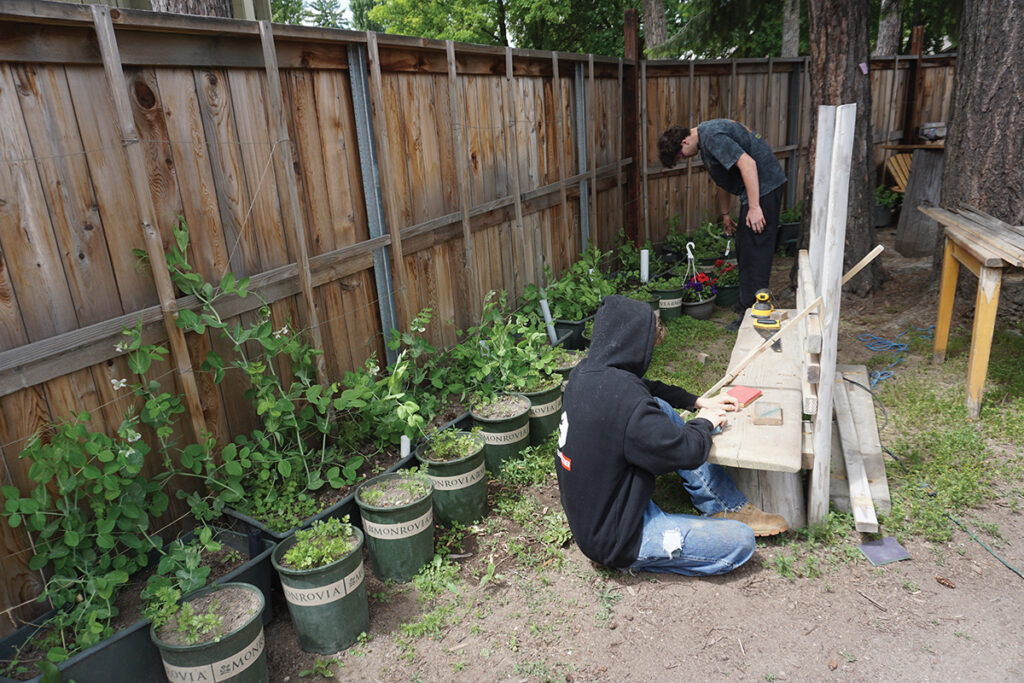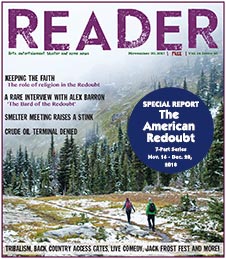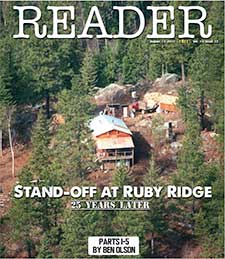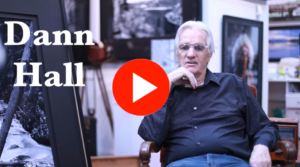Self-sufficiency, compassion and the philosophy of ‘chugal’
By Soncirey Mitchell
Reader Staff
The green-thumbed students at Lake Pend Oreille High School have been giving back to the community by building and maintaining gardens of all shapes and sizes — even portable bucket gardens — to bring fresh, organic food into the community. Students develop horticulture, design and fabrication skills as they transform scrap wood and seeds into low-cost, high-yield planters, and that’s just the beginning.
“I am a firm believer that if you help others, you help yourself,” said Career Technical Education culinary arts teacher Rand Rosecrans, who built the school’s garden alongside his students.
The entire student body gives back to the community in different ways — from volunteering at the Bonner Community Food Bank to cleaning the Ponderay Bay Trail — but students in Rosecrans’ classes have devised their own unique way of helping. Not only did they build the East Bonner County Library’s garden, but they’ve recently turned their attention to self-watering gardens made from two buckets, rope and some hosing, which they donated to local veterans through the Sandpoint VFW.
“We’re community-oriented. Our goal is to be a contributing, active, important part of this community, and that’s not a reputation that the alternative school has necessarily had in the past,” said Rosecrans.
Using buckets provided by Litehouse, the gardeners run a rope through the top bucket — usually planted with a tomato — into the bottom bucket full of water, wicking moisture up into the soil. The design minimizes evaporation and requires little maintenance, making for cost-effective, easy gardens perfect for the veterans. Through their hard work and ingenuity, the students make a big impact with a non-existent budget.
“We don’t have a football team. We don’t have a pep squad. What we have here are hearts and minds that have had challenges, and having had those challenges, sometimes that makes them much more resilient, much more rigorous, much tougher. We go out and do things to try to help other people around us, and so that’s the core of what we’re doing right here,” Rosecrans told the Reader.
Rosecrans — or “Chef” to his students — describes himself as having a “bit of the absent-minded professor reputation.” As he wanders his indoor-outdoor classroom, checking in on students writing essays, building benches and germinating plants, he instructs and encourages, even speaking the occasional Spanish. His holistic approach to teaching emphasizes self-sufficiency, compassion and hard work, and the students rise to the occasion.
“I try to give my kids a lot of voice and choice. I’m an unorthodox teacher because, a lot of times, I’ll start out my first session with, ‘Welcome to my class. The education system has failed you miserably. I plan on not doing that,’” said Rosecrans.
Between his time in Alaska and Idaho, Rosecrans has worked with high school students for around 37 years and prioritizes authenticity, transparency and honesty in his classroom. There, students cook for one another and learn technical skills, all the while ensuring that nothing goes to waste — a philosophy Rosecrans calls “chugal,” a portmanteau of “cheap” and “frugal.”
“Everything in here is basically handmade from scratch. I built this fence and most of these planters,” Ethan, one of the students working on the bucket gardens, told the Reader.
Thanks to a grant from the Sandpoint Rotary Club, students were able to purchase cedar to build a fence around their garden. Otherwise, everything else is made of donated and salvaged materials. Power tools that the students repair themselves sit atop workstations made from recycled pallets, and the classes shred every scrap of paper to incorporate into their compost and mulch, as well as their vermiculture bins, which produce the garden’s fertilizer.
Their system is designed to maximize their resources, enabling them to contribute more to the community.
“We basically just try to do something that’s as meaningful to the community as possible and share small parts of each other through, basically, agriculture and hanging out with each other,” said Ethan.
Students have planted corn, peas, onions, cucumbers, herbs and lettuce that can be harvested throughout the summer and fall to feed students and hopefully give the food bank fresh produce. Rosecrans’ teacher’s assistant, Iris, and a few other students will stop by and check on the garden periodically while school’s out, but that duty will mostly fall to Rosecrans.
“I drive by here a lot during the summer, and I always see his truck parked here. He loves his garden,” said Iris.
She and her fellow students are devoted to the work, but there was an undercurrent of sadness during the final week of school as the kids prepared to lose five teachers and many of their electives due to budget cuts. Only three new teachers will join the community next year, likely increasing the average class size.
“[The school’s] struggling a bit right now — a lot a bit — but we’re working as students and teachers, but mainly students, doing a lot to keep our school open because it’s going down low,” said Iris.
Students will have the opportunity to take electives through Sandpoint High School, but for most LPOHS pupils, who have unique time constraints and academic needs, the traditional system simply won’t work. Moreover, the students want to stay at their school.
“The kids in Chef’s class — we sit and we brainstorm ideas, and then Chef takes them to Luke [Childers, LPOHS principal] and proposes them. Sometimes it goes positive; sometimes it doesn’t. Luke likes to hear our ideas, but we have a lot of them,” said Iris.
Nothing’s been decided, but some proposals include selling the bucket gardens and other student creations to fund the school and implementing work-study programs with area businesses to take the place of electives.
“We’re in a transition period. We’re in a time of change, and we look to ourselves to see, ‘OK, what is it that we need to do to create that change in a positive and powerful manner for our students?’” said Rosecrans.
There’s no use “whining,” according to Rosecrans — the school and the teachers have a duty, and they will provide the education and opportunities their students deserve. For now, he’s is focused on showcasing his kids’ endless compassion, intelligence and work ethic.
“I need to show everybody what my kids are about because there has been some reputation. ‘Oh, those are the bad kids, blah, blah, blah.’ That’s not true. There are no bad kids. The reality is there are bad teachers; there are bad people supervising kids; there are bad administrations,” said Rosecrans. “I know and I see the heart and soul of my kids, and as we go out into the community, we show the community what they’re about.”










 Coming up this week! Don’t miss Live Music, the Summer Sampler, the Art Party, Monarch Grind, the Sandpoint Renaissance Faire, and more! See the full list of events in the
Coming up this week! Don’t miss Live Music, the Summer Sampler, the Art Party, Monarch Grind, the Sandpoint Renaissance Faire, and more! See the full list of events in the 